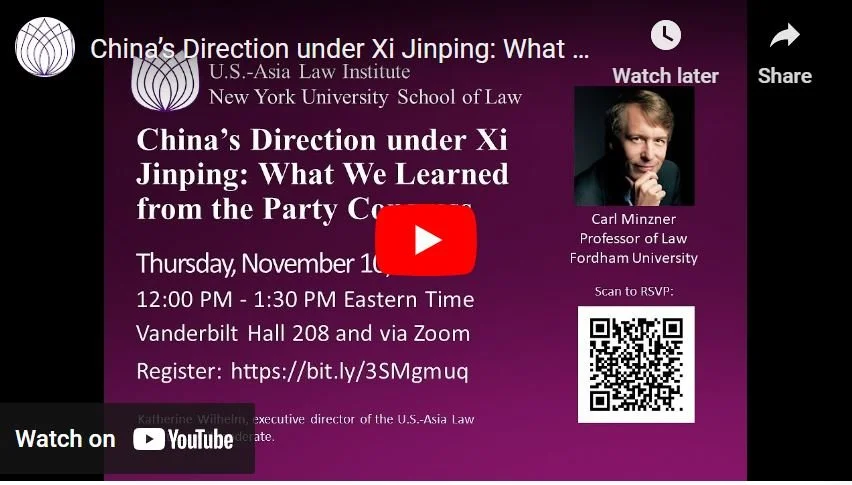China’s Direction under Xi Jinping: What We Learned from the Party Congress
Thursday, November 10, 2022
12:00 PM - 1:30 PM US Eastern Time
Vanderbilt 208 and via Zoom
Register here
About the event
China is steadily sliding into an era of highly centralized one-man rule. The recently concluded 20th National Congress of the Chinese Communist Party not only confirmed Xi Jinping as China's top leader for a third term, but packed the party’s senior ranks with his own close associates while sweeping out anyone not affiliated with him. Fordham Law Professor Carl Minzner will share his analysis of what we can expect for the next decade (or more) of Xi Jinping rule, based on the speeches and documents from the party congress and other recent messaging. He also will discuss what all this could mean for foreign scholars trying to conduct research in China and engage with peers there.
About the speakers
Carl Minzner
Carl Minzner is an expert in Chinese law and governance. He has written extensively on these topics in both academic journals and the popular press, and is the author of End of an Era: How China's Authoritarian Revival is Undermining its Rise. Representative academic works include China After the Reform Era, in the Journal of Democracy (2015), exploring China's transition away from the three-decades-long reform era characterized by political stability, ideological openness, and rapid economic growth; The Rise and Fall of Chinese Legal Education in the Fordham International Law Journal (2013), examining the expansion of Chinese legal education since the late 1990s and its impending retrenchment; and China's Turn Against Law in the American Journal of Comparative Law (2011) analyzing Chinese authorities’ shift away from the legal reform trajectory of the 1980s and 1990s. Before joining Fordham, he was an associate professor of law at Washington University in St. Louis. He was senior counsel for the Congressional-Executive Commission on China, international affairs fellow at the Council on Foreign Relations, and Yale-China legal education fellow at the Xibei Institute of Politics and Law in Xi'an, China.
Katherine Wilhelm
Katherine Wilhelm is executive director of the U.S.-Asia Law Institute, an adjunct professor at NYU School of Law, and editor of the institute’s online essay series, USALI Perspectives. She is an expert on China’s legal system, public interest law organizations, and civil society. She joined USALI in August 2019 after returning from nearly three decades of residence in Asia, where she split her career between law and journalism. Most recently she was the legal program officer at the Ford Foundation’s China office, where she funded Chinese legal advocacy NGOs and university-based legal research and education programs. Before that, she directed the Beijing office of Yale Law School’s China Law Center, which implements law reform projects in partnership with government, academia and civil society. Ms. Wilhelm also practiced corporate law in the Beijing office of a leading US law firm. Before beginning her career in law, she was a journalist. She reported for The Associated Press from Beijing, Hong Kong, and Hanoi, and for the Far Eastern Economic Review from Hong Kong and Shanghai. Her work has been published in leading newspapers around the world. She was a John S. Knight Journalism Fellow at Stanford University in 1996-97. She holds a J.D. from Columbia Law School, a master’s degree in East Asian studies from Harvard University, a master’s degree in journalism from Columbia University, and a bachelor’s degree in history from Niagara University.


